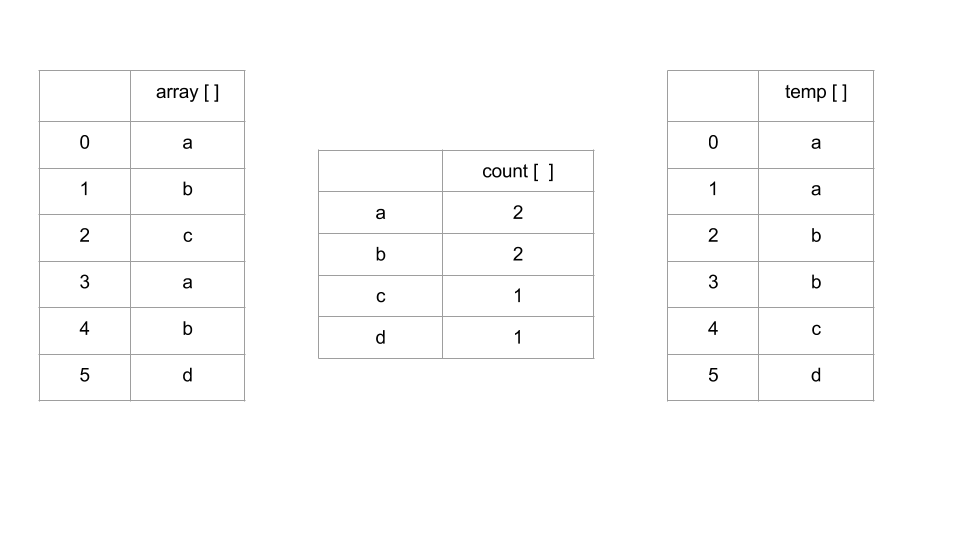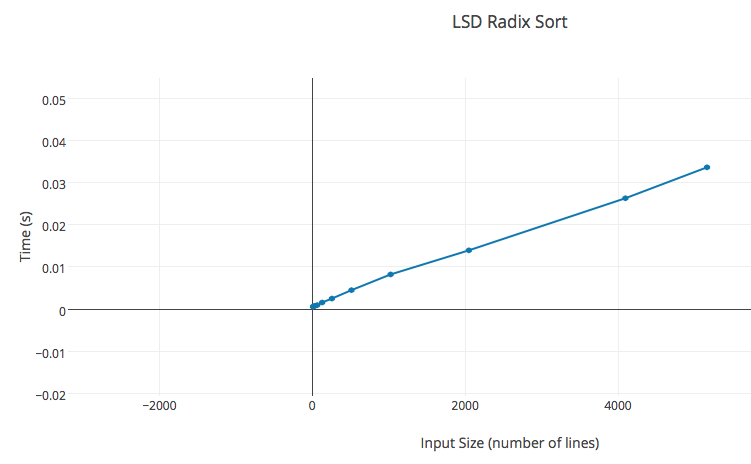Fri 20 Nov 2015
Quickly sort large file in linear time
Tags: lsd radix sort sorting cplusplus
Any deterministic general sorting algorithm has average case time complexity $$ \Omega(n\log{}n) $$ . However, certain sorting algorithm can run faster in $$ O(n) $$ but with limitation1. Instead of comparision-based sort, each element is looked individually by its value. Radix sort is one fine example of integer sorting.

Problem Statement
Suppose, we have large directory containing names of people in random order. The names need not be distinct. We need to sort the name in the ascending order. Also our algorithm should run in linear time. A sample of the input file is shown below2
JAMES 1.664 1.664 1
TUSHARSHARMATUSHARSHARMA 1.99 3
JOHN 1.642 3.305 2
ROBERT 1.576 4.881 3
MICHAEL 1.321 6.202 4
MARY 1.319 7.521 5
WILLIAM 1.230 8.750 6
DAVID 1.185 9.934 7
RICHARD 0.854 10.788 8
CHARLES 0.765 11.552 9
JOSEPH 0.705 12.257 10
THOMAS 0.692 12.948 11
PATRICIA 0.539 13.486 12
CHRISTOPHER 0.519 14.005 13
LINDA 0.518 14.523 14
BARBARA 0.490 15.013 15
Desired Output
The output file contains the names read from the file and sort them alphabetically.
AARON
ABBEY
ABBIE
ABBY
ABDUL
ABE
ABEL
ABIGAIL
ABRAHAM
ABRAM
ADA
ADAH
ADALBERTO
ADALINE
NOTE: Each line is read upto k = 21 characters (arbitrary). Any character after 21st position is truncated.
Radix Sort
Radix sorts the integer by their least significant @L \mathtt{d}@L bits. @L \mathtt{w}/\mathtt{d}@L passes are made to counting-sort which sorts @L \mathtt{w}@L-bit integers. Following could be easily implemented in C++.
1 2 3 4 5 6 7 8 | void lsdRadixSort(char S[][k]){ for (int d = k - 1; d >=0 ; d--) { countingSort(S, d); } } |
Procedure lsdRadixSort reads an array S of size n * k. For each d integers, it passes array and the index to countingSort procedure. The main sorting occurs at Counting Sort.
Counting Sort
Counting sort an array of integer of length n. Radix sort uses several passes of Counting Sort to sort the array of size n * k . The algorithm works like this
-
Count frequencies of each letter using key as index
-
Compute frequency cumulates
-
Access cumulates using key as index to find record positions.
-
Copy back into original array

Following is the C++ implementation of Counting Sort.
1 2 3 4 5 6 7 8 9 10 11 12 13 14 15 16 17 18 19 20 21 22 23 24 25 26 27 28 29 30 31 32 33 34 35 | void countingSortSwap(char S[][k], int j){ //here j is the column int count[256] = {0}; char temp[n][k]; temp[0][0] = ' '; for (int i = 0; i < n; i++) { int valueChar = (int) S[i][j]; count[valueChar + 1]++; } for (int p = 1; p < 256; p++) { count[p] += count[p - 1]; } for (int i = 0; i < n; i++) { int valueChar = (int)S[i][j]; int index = count[valueChar++]++; for (int p = 0; p < k; p++) { temp[index][p] = S[i][p]; } } for (int i = 0; i < n; i++) { for (int p = 0; p < k; p++) { S[i][p] = temp[i][p]; } }} |
More Efficiently?
Radix sort can also be implemented without avoiding the hassle of moving the array to and fro. We use a pointer array (array of string indices) indexP[0..n−1]. Initially, set indexP[i] = i for all i. During the sorting, we move these indices. At the end of sorting, indexP[0] will be the index of the string which is the first in the sorted order, indexP[1] the second string in the sorted order, and so on.
We also declare prevIndex[0..n-1] to keep track of indicies of previous sorting. Thus our lsdRadixSort procedure would be slighlty different as
1 2 3 4 5 6 7 8 9 10 11 12 13 | void lsdRadixSort(char S[][k], int indexP[]){ int count[k]; int prevIndex[n]; for (int d = 0; d < n ; d++ ) prevIndex[d] = d; for (int d = k - 1; d >=0 ; d--) { countingSortp(S, d, indexP, prevIndex); }} |
Following is the new C++ implementation of Counting Sort.
1 2 3 4 5 6 7 8 9 10 11 12 13 14 15 16 17 18 19 20 21 22 23 24 25 26 27 28 29 30 | void countingSort(char S[][k], int j, int indexP[], int prevIndex[]){ //here j is the column int count[256] = {0}; int tempCount[n]; memset(tempCount, 0, sizeof(int) * n); for (int i = 0; i < n; i++) { int valueChar = (int) S[prevIndex[i]][j]; count[valueChar + 1]++; } for (int p = 1; p < 256; p++) { count[p] += count[p - 1]; } for (int i = 0; i < n; i++) { int valueChar = (int)S[prevIndex[i]][j]; int index = count[valueChar++]++; tempCount[index] = prevIndex[i]; } for (int i = 0; i < n; i++) { indexP[i] = tempCount[i]; prevIndex[i] = tempCount[i]; }} |
Finally we print the names in ascending order in the file as per as the sorted indexP[0 .. n-1].
1 2 3 4 5 6 7 8 9 10 11 12 13 14 15 16 17 18 | printToFile(char S[][k], string filename, int indexP[]) { int tempP[n]; memset(tempP, 0, sizeof(int) * n); fo.open\(filename.c\_str\(), ios::out | ios::binary); if (!fo) { cout<<"Error opening the file\n"; exit(-1); } for (int i = 0; i < n; i++) { for (int j = 0; j < k; j++) { fo <<S[indexP[i]][j]; } fo<<endl; }} |
Conclusion
The sort runs in linear time as discussed earlier. Below is time it took against input of different size.
| n | k | time (s) |
| 8 | 21 | 0.000591 |
| 16 | 21 | 0.000674 |
| 32 | 21 | 0.000762 |
| 64 | 21 | 0.000961 |
| 128 | 21 | 0.001582 |
| 256 | 21 | 0.002517 |
| 512 | 21 | 0.004514 |
| 1024 | 21 | 0.008236 |
| 2048 | 21 | 0.013947 |
| 4096 | 21 | 0.0263 |
| 5164 | 21 | 0.033631 |

Download the code